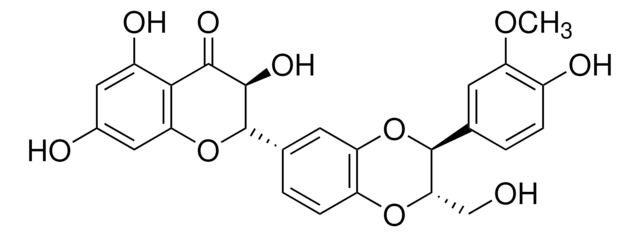1705312
USP
Ubidecarenone for System Suitability
United States Pharmacopeia (USP) Reference Standard
Synonym(s):
Coenzyme Q10, Q-10, Ubiquinone 50, Ubiquinone-10
About This Item
Recommended Products
grade
pharmaceutical primary standard
API family
ubidecarenone
manufacturer/tradename
USP
application(s)
pharmaceutical (small molecule)
format
neat
storage temp.
−20°C
SMILES string
O=C(C(OC)=C1OC)C(C/C=C(C)/CC/C=C(CC/C=C(CC/C=C(CC/C=C(CC/C=C(CC/C=C(C)/CC/C=C(C)/CC/C=C(C)/CCC=C(C)C)\C)\C)\C)\C)\C)=C(C)C1=O
InChI
1S/C59H90O4/c1-44(2)24-15-25-45(3)26-16-27-46(4)28-17-29-47(5)30-18-31-48(6)32-19-33-49(7)34-20-35-50(8)36-21-37-51(9)38-22-39-52(10)40-23-41-53(11)42-43-55-54(12)56(60)58(62-13)59(63-14)57(55)61/h24,26,28,30,32,34,36,38,40,42H,15-23,25,27,29,31,33,35,37,39,41,43H2,1-14H3/b45-26+,46-28+,47-30+,48-32+,49-34+,50-36+,51-38+,52-40+,53-42+
InChI key
ACTIUHUUMQJHFO-UPTCCGCDSA-N
Looking for similar products? Visit Product Comparison Guide
General description
Application
Also, for use with USP monograph such as Ubidecarenone
Analysis Note
Other Notes
Storage Class Code
11 - Combustible Solids
WGK
WGK 3
Flash Point(F)
Not applicable
Flash Point(C)
Not applicable
Choose from one of the most recent versions:
Certificates of Analysis (COA)
Sorry, we don't have COAs for this product available online at this time.
If you need assistance, please contact Customer Support.
Already Own This Product?
Find documentation for the products that you have recently purchased in the Document Library.
Our team of scientists has experience in all areas of research including Life Science, Material Science, Chemical Synthesis, Chromatography, Analytical and many others.
Contact Technical Service


